#chronicles of extraction book one
Text
A writer’s guide to the historical method: how historians work with sources
In this post, I provide a brief overview of how historians engage with different types of sources, with a focus on the mindset of a historian. This insight could be valuable for anyone crafting a character whose profession revolves around history research. It may also prove useful for authors conducting research for their book.
Concept of historical source
The concept of historical source evolves over time.
Initially, the focus was mainly on written sources due to their obvious availability. However, as time has progressed, historians now consider a wide range of sources beyond just written records. These include material artifacts, intangible cultural elements, and even virtual data.
While "armchair historians" may rely on existing studies and secondary sources, true professional historians distinguish themselves by delving directly into primary sources. They engage in a nuanced examination of various sources, weaving together diverse perspectives. It's crucial to recognize the distinction between personal recollection or memory and the rigorous discipline of historical inquiry. A historical source provides information, but the truth must be carefully discerned through critical analysis and corroboration.
Here's a concise list of the types of sources historians utilize:
Notarial source
Epistolary source
Accountancy source
Epigraphic source
Chronicle source
Oratory and oral source
Iconographic source
Diary source
Electronic source
Example: a notarial source
These are documents drafted by a notary, a public official entrusted with providing legal certainty to facts and legal transactions. These documents can take various forms, such as deeds, lawsuits, wills, contracts, powers of attorney, inventories, and many others.
Here we are specifically discussing a lawsuit document from 1211 in Italy.
A medieval lawsuit document is highly valuable for understanding various aspects of daily life because in a dispute, one must argue a position. From lawsuits, we also understand how institutions truly operated.
Furthermore, in the Middle Ages, lawsuits mostly relied on witnesses as evidence, so we can access a direct and popular source of certain specific social situations.
Some insight into the methodology of analysis:
Formal examination: historians scrutinize the document's form, verifying its authenticity and integrity. Elements such as structure, writing style, language, signatures, and seals are analyzed. Indeed, a professional historian will rarely conduct research on a source published in a volume but will instead go directly to the archive to study its origin, to avoid transcription errors.
Content analysis: historians proceed to analyze the document's content, extracting useful information for their research. This may include data on individuals, places, events, economic activities, social relations, and much more. It's crucial to compile a list of witnesses in a case and identify them to understand why they speak or why they speak in a certain manner.
Cross-referencing with other sources: information derived from the notarial source is compared with that of other historical sources to obtain a more comprehensive and accurate view of the period under examination.
Documents of the episcopal archive of Ivrea
Let's take the example of a specific legal case, stemming from the documents of the episcopal archive of Ivrea. It's a case from 1211 in Italy involving the bishop of Ivrea in dispute with Bongiovanni d'Albiano over feudal obligations.
This case is significant because it allows us to understand how feudal society operated and how social status was determined.
The bishop's representative argues that Bongiovanni should provide a horse as a feudal service. Bongiovanni denies it, claiming to be a noble, not a serf. Both parties present witnesses and documents supporting their arguments.
Witnesses are asked whether the serf obligations had been endured for a long time. This helps us understand that in a society where "law" was based on customs, it was important to ascertain if an obligation had been endured for a long time because at that point it would no longer be contestable (it would have become customary).
The responses are confused and inconsistent, so witnesses are directly asked whether they consider Bongiovanni a serf or a noble. This is because (and it allows us to understand that) the division into "social classes" wasn't definable within concrete boundaries; it was more about the appearance of one's way of life. If a serf refused to fulfill his serf duties, he would easily be considered a noble by bystanders because he lived like one.
Ultimately, the analysis of the case leads us to determine that medieval justice wasn't conceived with the logic of our modern system, but was measured in oaths and witnesses as evidentiary means. And emerging from it with honor was much more important than fairly distributing blame and reason.
Other sources
Accounting source: it is very useful for measuring consumption and its variety in a particular historical period. To reconstruct past consumption, inventories post mortem are often used, which are lists of goods found in households, described and valued by notaries to facilitate distribution among heirs.
Alternatively, the recording of daily expenses, which in modern times were often very detailed, can lead to insights into complex family histories and their internal inequalities - for example, more money might be spent on one child than another corresponding to their planned future role in society.
Oral source: in relation to the political sphere, it is useful for representing that part of politics composed of direct sources, that is, where politics speaks of itself and how it presents itself to the public, such as a politician's public speech.
However, working with this type of source, a historian cannot avoid hermeneutic work, as through the speech, the politician aims to present himself to a certain audience, justify, persuade, construct his own image, and achieve results. This is the hidden agenda that also exists in the most obvious part of politics.
Iconographic source: it concerns art or other forms of "artistic" expression, such as in the case of an advertising poster. They become historical sources when it is the historian who, through analysis, confers upon them the status of a historical source. Essentially, the historian uses the source to understand aspects of the past otherwise inaccessible.
The first step in this direction is to recontextualize the source, returning it to its original context. Examining the history of the source represents the fundamental first step for historical analysis.
Diary source: diaries are a "subjective" source, a representation of one's self, often influenced by the thoughts of "others," who can be close or distant readers, interested or distracted, visible or invisible, whom every diary author can imagine and hope to see, sooner or later, reflected on the pages of their writing.
Furthermore, they are often subject to subsequent manipulations, and therefore should be treated by historians only in their critical edition; all other versions, whether old or new, foreign or not, are useful only as evidence of the changes and manipulations undergone over time by the original manuscripts.
Electronic source: historians use Wikipedia even if they often don't admit it out loud.
This blog is supported through tips here on Tumblr. If you’d like to support me, please consider giving a tip.
#writing advice#writing help#writing reference#writing tips#creative writing#fantasy worldbuilding#fantasy writing#worldbuilding#worldbuilding tips
297 notes
·
View notes
Text
Dune Frank Herbert
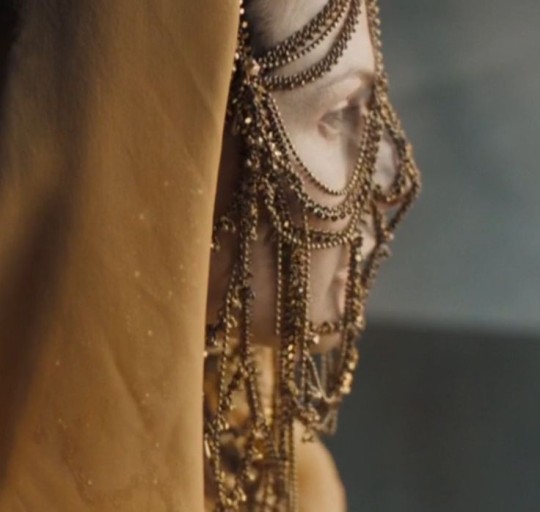
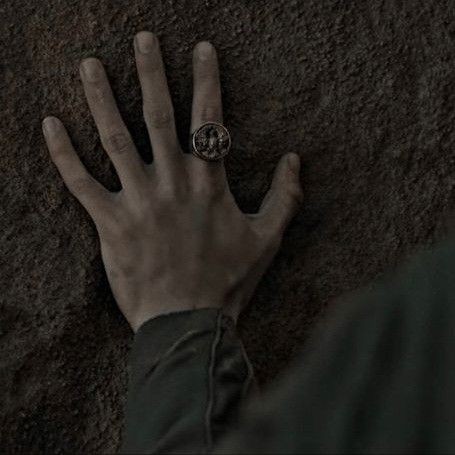

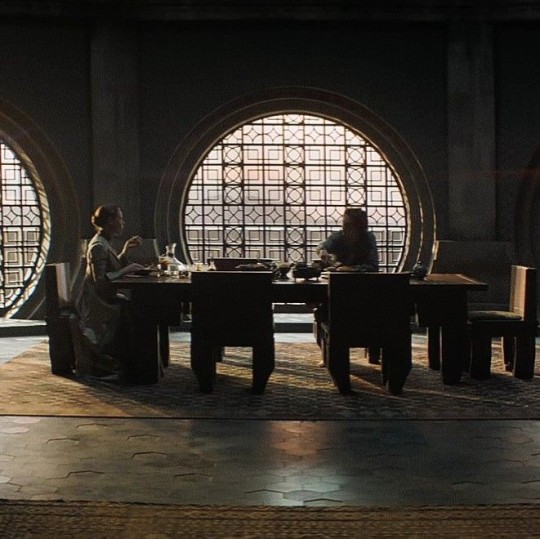
“Dune" is, without exaggeration, an era, a magnitude in literature that is difficult to overestimate. A science fiction saga, with elements of the novel of chronicles and adulthood, space opera and dystopia, metaphorical narrative full of philosophy and mysticism.
The first trilogy of the classic cycle is full of the life and life of a free people, the planetary ecosystem including the giant worms, echoes of courtly strife, the structure of organizations equally ruling the Known Universe but also dependent on the spice that is produced only on Arrakis.
High and intense text full of concentrated substrate based on religion, politics, ecology, legal and cultural issues, immediate survival, while learning about the future.
The plot is fascinating, like standing in the center of a huge temple complex in Kornak, where the desert wind brings the essence of plans within plans.
Compared to the TV series and screen adaptations, the book predetermines the accents in relation to the characters, making them full and vivid, clear in plot twists, meeting the author's intent and the logic of behavior under given conditionsThe story itself I really liked, probably partly because I generally love fiction and somehow have not read something interesting and non-anal of this genre for a long time. A lot of fiction books are based on Christianity, and this is the first book in my memory that is based on Islam.
I also like the way Frank Herbert describes the characters' looks - almost without details, leaving room for imagination. The story is not long, lively enough and colorful enough, and I have experienced this forgotten feeling again and again, when I want to return to the book to find out what is going on.One of the main themes is the opposition between the houses of Atreides and Harkonnen. In these quotes, a clear example of the difference between the houses: the Atreides pay love for loyalty, while the Harkonnens gain submission through hatred. 'How much he talks! - Hawat thought. - This is not Duke Leto, who could speak to me with a wave of the hand, a movement of the eyebrow. What a carcass! The author (maybe the translation) shows Vladimir Harkonnen as a huge carcass, which has accumulated large reserves of precious water. This is the main peculiarity of the desert Arrakis. Arrakis. A desert planet, also known as Dune. There, under the scorching sun, there float huge worms on the sand, from which it is impossible to hide. There’s a free folk out there - Fremen with blue-tinted eyes that cover even squirrels. And, most importantly, Arrakis - the only place where the spice is extracted. Spice or melange - the most important wealth in the universe. If water is commonplace on Kaladan... here, in the desert conditions, its value is high. To show your respect, love, loyalty, you must share water. Whether it's spitting or mourning the dead. One of my favorite characters is the planetologist Kynes, who dreamed of turning the desert into an oasis. His father managed to plant and implement this idea among the Freemen, and his son continued his work ... Freemen are a hardened people of the desert with their own philosophy and way of life...they were told that the work of greening Arrakis is labor-intensive and the results can be fully appreciated only by the eighth generation. Not only that, but the Freemen and the Kynes did not abandon it, but passed it on from generation to generation. Valuable and very much appreciated. Chani is a great representative of the Freemen. Honestly, I didn't really understand why Jessica didn't think she was a good match for her son, even though she thought she was a worthy representative of the Bine Gesaerit school. Chani is wise, intelligent and loving to Paul. She is such a reliable and strong support for him.In general, the novel is a very interesting story, competently combining social problems, political peripetias, religious ascents, life philosophy, many multi-layered mysteries, and I think, even some meditation.And all this cornucopia is doused in beautiful, smooth, syllable with detailed, distinctive style descriptions that include perfectly developed characters. I wholeheartedly recommend the novel, I don't know if I'll be able to experience all six books, but I'm now serious about part two. For anyone interested, I recommend that you be patient and take your time with this story, getting to know it at your own pace.
#aesthetic#light academia#romantic academia#academia aesthetic#chaotic academia#classic academia#dark academia#dead poets society#book review#donna tartt#dune movie#dune#dune books#reading#books#book history#fantasy
25 notes
·
View notes
Text
Every Instance of Lord Byron Hating On John Keats, Listed in Chronological Order.
“No more Keats I entreat — flay him alive. If some of you don’t I must skin him myself.”

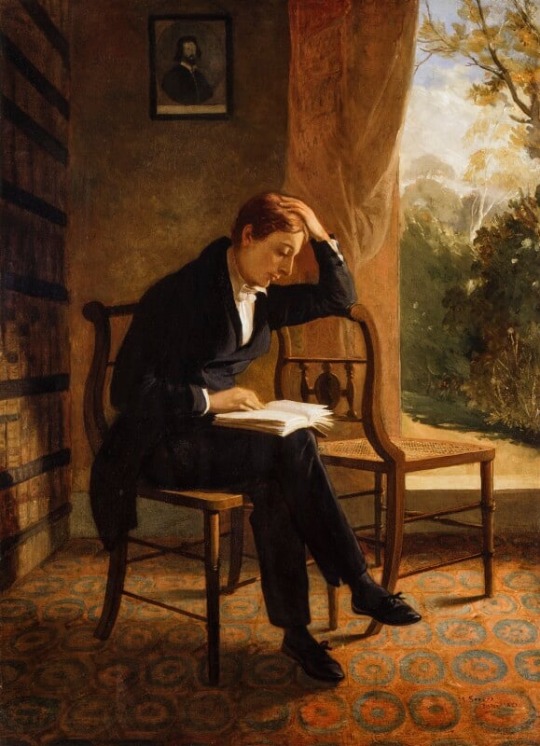
To his publisher John Murray, 12 October 1820:
“‘I’m thankful for your books dear Murray / But why not send Scott’s Monastery?’ the only book in four living volumes I would give a baioccho to see, abating the rest of the same author, and an occasional Edinburgh & Quarterly – as brief Chroniclers of the times. — Instead of this – here are John Keats’s piss a bed poetry – and three novels by God knows whom [..] Pray send me no more poetry but what is rare and decidedly good. — There is such a trash of Keats and the like upon my tables – that I am ashamed to look at them. [..] – I am in a very fierce humour at not having Scott’s Monastery. – You are too liberal in quantity and somewhat careless of the quality of your missives. – [..] No more Keats I entreat – – – flay him alive – if some of you don’t I must skin him myself. There is no bearing the drivelling idiotism of the Mankin. – – – – – [editor’s note: ‘dashes degenerate into scrawl’]”
To his publisher John Murray, 4 November 1820:
“They Support Pope I see in the Quarterly. [Let them] Continue to do so – it is a Sin & a Shame and a damnation – to think that Pope!! should require it – but he does. – – – Those miserable mountebanks of the day – the poets – disgrace themselves – and deny God – in running down Pope – the most faultless of Poets, and almost of men – – the Edinburgh praises Jack Keats or Ketch or whatever his names are; – why his is the Onanism of Poetry — something like the Pleasure an Italian fiddler extracted out of being suspended daily by a Street Walker in Drury Lane – this went on for some weeks – at last the Girl – went to get a pint of Gin – met another, chatted too long – and Cornelli was hanged outright before she returned. Such like is the trash they praise – and such will be the end of the outstretched poesy of this miserable Self-polluter of the human Mind [editor’s note: ‘untranscribable scrawl’]. W. Scott’s Monastery just arrived — many thanks for that Grand Desideratun of the last Six Months.”
Note: “onanism” refers to masturbation.
To his publisher John Murray, 9 November 1820:
“Mr. Keats whose poetry you enquire after — appears to me what I have already said; such writing is a sort of mental masturbation — he is always frigging his Imagination. I don’t mean that he is indecent, but viciously soliciting his own ideas into a state which is neither poetry nor any thing else but a Bedlam vision produced by raw pork and opium.”
Note: “frigging” was slang for masturbation.
To his publisher John Murray, 18 November 1820:
“P.S. — Of the praises of that little dirty blackguard Keates in the Edinburgh — I shall observe as Johnson did when Sheridan the actor got a pension. ‘What has he got a pension? then it is time that I should give up mine!’ — Nobody could be prouder of the praises of the Edinburgh than I was — or more alive to their censure — as I showed in English Bards and Scotch Reviewers — at present all the men they have ever praised are degraded by that insane article. — Why don't they review & praise ‘Solomon's Guide to Health’ it is better sense — and as much poetry as Johnny Keates.”
To his publisher John Murray 26 April 1821:
“Is it true – what Shelley writes me that poor John Keats died at Rome of the Quarterly Review? I am very sorry for it – though I think he took the wrong line as a poet – and was spoilt by Cockneyfying and Surburbing – and versifying Tooke’s Pantheon and Lempriere’s Dictionary. I know by experience that a savage review is Hemlock to a sucking author – and the one on me – (which produced the English Bards &c.) knocked me down – but I got up again. Instead of bursting a blood-vessel – I drank three bottles of Claret – and began an answer – finding that there was nothing in the Article for which I could lawfully knock Jeffrey on the head in an honourable way. However I would not be the person who wrote the homicidal article – for all the honour & glory in the World, – though I by no means approve of that School of Scribbling – which it treats upon.”
To Percy Shelley, 26 April 1821:
“I am very sorry to hear what you say of Keats — is it actually true? I did not think criticism had been so killing. Though I differ from you essentially in your estimate of his performances, I so much abhor all unnecessary pain, that I would rather he had been seated on the highest peak of Parnassus than have perished in such a manner. Poor fellow! though with such inordinate self-love he would probably have not been very happy. I read the review of ‘Endymion’ in the Quarterly. It was severe, — but surely not so severe as many reviews in that and other journals upon others.
I recollect the effect on me of the Edinburgh on my first poem; it was rage, and resistance, and redress — but not despondency nor despair. I grant that those are not amiable feelings; but, in this world of bustle and broil, and especially in the career of writing, a man should calculate upon his powers of resistance before he goes into the arena. ‘Expect not life from pain nor danger free, Nor deem the doom of man reversed for thee.’
You know my opinion of that second-hand school of poetry. You also know my high opinion of your own poetry, — because it is of no school. [..] I have published a pamphlet on the Pope controversy, which you will not like. Had I known that Keats was dead — or that he was alive and so sensitive — I should have omitted some remarks upon his poetry, to which I was provoked by his attack upon Pope, and my disapprobation of his own style of writing.”
To Percy Shelley, 30 July 1821:
[First page missing] “The impression of Hyperion upon my mind was – that it was the best of his works. Who is to be his editor? It is strange that Southey who attacks the reviewers so sharply in his Kirk White – calling theirs ‘the ungentle craft’ – should be perhaps the killer of Keats. Kirke White was nearly extinguished in the same way – by a paragraph or two in ‘the Monthly’ – Such inordinate sense of censure is surely incompatible with great exertion – have not all known writers been the subject thereof?”
To his publisher John Murray 30 July 1821:
“Are you aware that Shelley has written an Elegy on Keats, and accuses the Quarterly of killing him?
‘Who killed John Keats? / ‘I,’ says the Quarterly, / So savage and Tartarly; / ‘Twas one of my feats.’ / Who shot the arrow? / ‘The poet-priest Milman / (So ready to kill man), / Or Southey or Barrow.’’
You know very well that I did not approve of Keats’s poetry, or principles of poetry, or of his abuse of Pope; but, as he is dead, omit all that is said about him in any M.S.S. of mine, or publication. His Hyperion is a fine monument, and will keep his name. I do not envy the man who wrote the article; — you Review people have no more right to kill than any other footpads. However, he who would die of an article in a Review would probably have died of something else equally trivial. The same thing nearly happened to Kirke White, who died afterwards of a consumption.”
4 August 1821, to his publisher John Murray:
“You must however omit the whole of the observations against the Suburban School – they are meant against Keats and I cannot war with the dead – particularly those already killed by Criticism. Recollect to omit all that portion in any case.”
To his publisher John Murray, 7 August 1821:
“All the part about the Suburb School must be omitted – as it referred to poor Keats now slain by the Quarterly Review — [..] I have just been turning over the homicide review of J. Keats. – It is harsh certainly and contemptuous but not more so than what I recollect of the Edinburgh R. of ‘the Hours of Idleness’ in 1808. The Reviewer allows him ‘a degree of talent which deserves to be put in the right way’ ‘rays of fancy’ ‘gleams of Genius’ and ‘powers of language’. – It is harder on L. Hunt than upon Keats & professes fairly to review only one book of his poem. – Altogether – though very provoking it was hardly so bitter as to kill unless there was a morbid feeling previously in his system.”
To Thomas Moore, August 27th 1822:
“It was not a Bible that was found in Shelley's pocket, but John Keats's poems.”
From his poem Don Juan Canto Eleventh written October 1822 and published August 1823. He was going off the popular gossip shared to him by Shelley (who believed it), which was that Keats health had sharply declined due to receiving bad reviews:
“John Keats, who was killed off by one critique, / Just as he really promised something great, / If not intelligible, without Greek / Contrived to talk about the Gods of late, / Much as they might have been supposed to speak. / Poor fellow! His was an untoward fate; / ‘Tis strange the mind, that very fiery particle, / Should let itself be snuffed out by an article.”
To his publisher John Murray, 25 December 1822:
“As to any community of feeling, thought, or opinion, between Leigh Hunt and me, there is little or none. We meet rarely, hardly ever; but I think him a good-principled and able man, and must do as I would be done by. I do not know what world he has lived in – but I have lived in three or four – and none of them like his Keats and Kangaroo terra incognita – Alas! poor Shelley! – how he would have laughed – had he lived, and how we used to laugh now & then – at various things – which are grave in the Suburbs. You are all mistaken about Shelley – – you do not know – how mild – how tolerant – how good he was in Society – and as perfect a Gentleman as ever crossed a drawing room; – when he liked – & where he liked. – – – – –“
The excerpts above are taken primarily from Peter Cochran’s transcriptions.
#contrary to stereotypes byron wasn’t always like this - he just rly hated keats’ poetry#literature#english literature#dark academia#lord byron#romanticism#poetry#history#writing#john keats#letters#journals#interesting#1800s#regency era#19th century#english#books#bookblr#authors#writers#gothic literature#romantic literature#romantic poets#keats#byron#feuds#literary history#quotes#excerpts
107 notes
·
View notes
Note
re your post about it--i'm curious about your thoughts on the global middle ages! i did my bachelors in medieval studies and whenever somebody asks, i talk about how the medieval period refers to a specific historical arc in a specific geographical range where a specific group of cultures were mingling. we don't talk about "medieval australia" in the same way we don't talk about "third intermediate period british isles" or "edo period caribbean," right? my thinking is that that's because the various cultural moments that led us to denote that date range as a specific period didn't happen in every culture, everywhere. the history of other geopolitical regions is periodized in ways that reflect historians' ideas of those regions' own major cultural shifts and such.
now i absolutely have not been keeping up with current discussions in the field, and if it's a whole thing totally feel free to tell me to just google it. but if you do have thoughts about it that you want to share, or literature to point me towards, i'd love to hear!
I think it kind of is A Whole Thing right now, alas, but! I do think the original idea of the global middle ages is important — it helps to gain a broader understanding of the premodern past. while “medieval” or “middle ages” has been used to almost exclusively refer to western europe c. 500-1500, we KNOW that there was trade and travel happening between europe, the SWANA region, and east asia, and that trade/travel certainly influenced culture/literature/etc. if we don’t also look to these regions we’re missing out on vital info about how the medieval world worked in direct contact with the western european regions we typically associate with the middle ages. in addition, thinking globally can also invite collaboration across disciplinary boundaries that are set apart for the reasons you mention — I’m thinking, for instance, of the interesting and important work that scholars like tarren andrews, suzanne conklin akbari, adam miyashiro, brenna duperon, etc., have been doing in collaboration between indigenous studies and medieval studies. nahir otaño-gracia has also been doing some interesting work on caribbean medievalisms and we know from late medieval/early modern documents that medieval understandings of race and monstrosity went hand in hand with the colonial projects of western europe.
one of the issues that’s been going around with global middle ages though is 1) it’s still not really “global” (for the reasons above, the research has mostly been focused on SWANA/east asia) and 2) it often tends to end up in the “I am giving my class one non-western european text (or maybe even just mandeville or marco polo or a crusade chronicle) in our survey class and patting myself on the back for my global syllabus” area OR the “this field is so incredibly not diverse and perhaps some of these people should think about why and how they’re engaging with these regions/cultures” issue re: extractive reading/research practices that don’t engage with the cultures whose history/practices/literature they’re using (tarren andrews’ work does a really good job of laying this out)
I personally would love if there were more collaboration happening across fields to make conversations about the premodern world across geopolitical and historical boundaries because I think it’s really interesting, and I think that how we set up periodization in history/literature creates artificial boundaries that can foreclose on understanding the diverse and interconnected nature of the medieval world. also the post I made was brought on by a public history book I’m reading about medieval women where I was thinking about how much I’d love to know about women in the medieval world outside of just western europe but it’s so much harder to find public history casual reading type stuff about those topics (and like. I can and do read academic books all the fucking time but I would love for some more public-facing stuff that’s a less intensive read)
#like I took a grad seminar on old french in the medieval world that was really interesting because we went all the way to east asia#but my undergrad survey courses? mostly england with a dash of scandinavia and france#anyway hope that makes sense it’s late at night and my brain is mostly done for the day
10 notes
·
View notes
Text
look, the kingkiller chronicle (the name of the wind + a wise man's fear, by patrick rothfuss) is not a perfect series or anything, i love it a lot but i have Opinions - but. it IS one of those book series that's lodged itself very deeply into my brain for better and for worse. it lives there now, along with animorphs (a series i haven't read since i was a preteen) and some other friends. you know how it is!!
anyway every now i think about a Thing from kkc and it's like. i need to talk about this. i don't know who to talk about this to. hence: my blog. and usually the thing i need to talk about is the adem. for those who haven't read kkc, the adem is one of the people's in this fantasy setting. their country and culture is very isolationist, their only export are mercenaries (Very Good Mercenaries Who Know Martial Art Secrets), they have a very different culture than the rest of the continent and therefore come across as very strange and mysterious. from a worldbuilding perpective, i think the adem are super cool. i love that rothfuss really leaned into developing a very different culture, even if there's... Some Things That Do Not Scan.
in the story, we find out that their culture is matriarchal, and they consider their women to be better fighters than their men. in fact, we find out they regard men as lesser because they don't realize that men contribute to uh, the creation of children. their culture is very big on casual sex and i don't think they do marriages or pairings like that at all, so their belief is that women Just Get Pregnant Sometimes! which is a fresh and fascinating take on the fantasy trope of "hmm how would a matriarchal society work" but ALSO. also. this would not happen. this could not happen in a world where queer people exist. there are canonically gay and bi people in these books. obviously i was reading this as a baby ace and was like HMMMMMMMM DOUBT. i cannot suspend my disbelief enough to think that every single woman in ademre would want to have (cisheterosexual) intercourse frequently enough for this to be a believable assumption, especially if there's no societal pressure to do it for reproduction!!! IT SIMPLY DOES NOT SCAN.
like, it's not that i'm a stranger to fiction ignoring the fact that Maybe Not Everyone In The World Wants Sex, that's kind of the eternal background noise of 95% of all media. i think maybe this one instance drives me nuts because from an aro perspective, i LOVE some funky fresh Alternative Family Structure worldbuilding and separating sex from romance. but then the sex thing. this whole thing is like.... an aro W but an ace L. it made it so far and then fell flat on its face. screams!!!!
THIS WASN'T EVEN THE THING I WANTED TO TALK ABOUT THOUGH. i just can't bring up the adem without talking about What The Fuck Was Up With That. the other very cool part of worldbuilding is how the adem express themselves - they keep their faces blank, but express emotions through hand gestures. and today................... i finally made the connection between This and Autism. I SHOULD'VE MADE IT SOONER. i've been recently coming to realise i don't really watch people's body language or expressions very closely irl - i don't know if it's because i'm bad at reading it, or if i just live in scandinavia and i think we're not so big on body language/eye contact over here, so there's not much information for me to extract? a lot of people tell me that they communicate a lot better when meeting people in person, and i kind of, can not relate to this very much? i can not think of anything i get from meeting people in person that i can't get over text except the speed of conversation. like, sure, there's Tone of Voice but i don't always find it the most reliable piece of information, either. in fact text makes it easier to parse the words and gives me the time and space to reply appropriately. THIS IS PROBABLY A ME THING. I MAY BE MORE AUTISTIC THEN I THOUGHT. welcome to my favourite game of "is it the autism or is it scandinavia"
BUT. i gesture with my hands A Lot. many people have pointed this out to me. i have no idea how expressive i am with my face, but i'm Very expressive with my hands!!! i haven't really thought about this until recently and that's when. the memory of the adem struck again. THEIR NEUTRAL FACES AND THEIR EXPRESSIVE GESTURES..................... NO EYE CONTACT, WATCH THE HANDS....................................... what a fantastic concept. i would adopt this if i could. it does make me wonder though, would it be easier or harder to be autistic in a culture like that? you would still need to learn hand expressions and all the subtle social rules... but it seems more accessible to me, somehow.
anyway that was tonight's KKC thought. it was autism
#haiz reads things#not something i've read in a while but im having THOUGHTS#anyway i figured out how to post this pot on this very functional website#made a draft and copypasted each parapraph in one at a time and saved inbetween
7 notes
·
View notes
Note
Who is your favourite OC?
Can you describe them? 🤭♥️
I have a lot but I'll separate them in categories or whatever it is spelled
Bungou Stray Dogs



Makoto Dazai
Makoto Dazai is 8 months younger than Osamu Dazai
Being Ougai Mori's bodyguard, Makoto is in the Port Mafia even after what happened with Oda, he has always and will always stay on Mori's side. His ability makes him able to control rats
Makoto is a trans boy, autistic and blind, also Ougai Mori's height. Osamu is obsessed with him in a way that he overprotects his younger brother
Hiroki Maruyama
Covering his right eye because someone took that eye, Hiroki Maruyama is a 28 years old who shares Chuuya's height
Grumpy former trainer in a yakuza, nowadays works in a brothel but in an AU he's a teacher in a school. He's disabled not only because he sees through one eye that makes his life difficult, he has issues walking and is always using a cane
574
2 meters tall man looks scary but is actually extremely soft
Former trainer in a yakuza, now takes care of the daughter of the boss who died. He's a bodyguard, has always been a bodyguard and is in charge of giving the numbers to the people of his (previous) criminal organization
From 0 to 1.000.000, the closest it is to the 0, the stronger the person is with their ability/skill
Bungou Stray Dogs Beast

Gabriel García Márquez
Inspired in the author of the same name, he's from BSD Beast
He owns a restaurant (cat cafe) with his cousin Ángela Vicario and her husband Bayardo San Román. His ability is inspired in the book Chronicle Of A Death Foretold, he's the same age as Hirotsu
M. M.

Max Gómez
Protagonist of the first part of my original story. Max Multiverse
He's a grumpy teenager in that picture, and uh it's hard to explain his world but I hope the multiverse-thing give you an idea
He's 25% a OC self-insert, I started doing his story when I was literally 4 years old lol
Kid is the vessel of a powerful demon, mother abusive, doesn't know his biological dad is the brother of his dad, has an older brother... Max ended up in an asylum after burning his house with his family in, ended up doing a deal with the strongest demon of them all and bla bla bla
B. A. D.
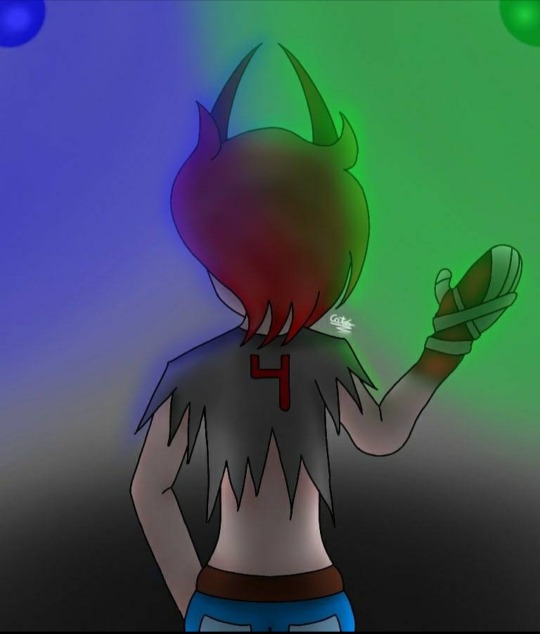
Jack 4
That draw is old as fuck but he's the Jack of universe 4, from the second part of my original story, Black And Demons
Jacks are demons that are the personifications of traumas in humans, the reason why they are traumas rather than the feeling of fear
Jack 4 is in charge of a place called «The Prison/Jail» where powerful and dangerous being are sent so the multiverse won't be destroyed. Oh and his right hand? Oh it's connected to the place he's also locked in and can't scape
BSD OCs inspired in authors excluding Gabriel García Márquez
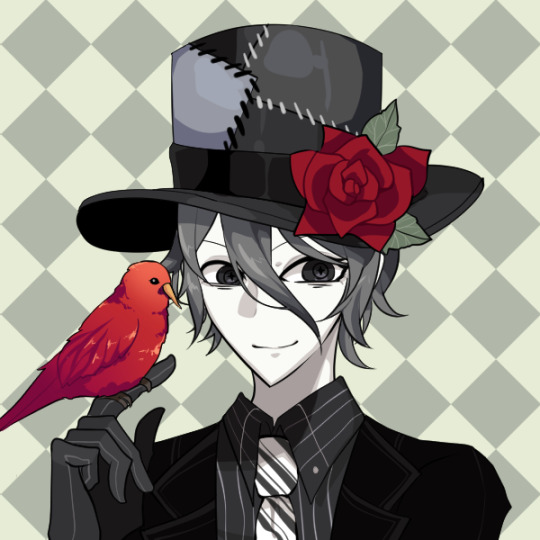
Egon Wolff
He's a homeless person inspired of two characters by Egon Wolff. El Merluza in Paper Flowers and China in The Invaders
Ranpo doesn't trust him and is afraid of him
Obey Me!
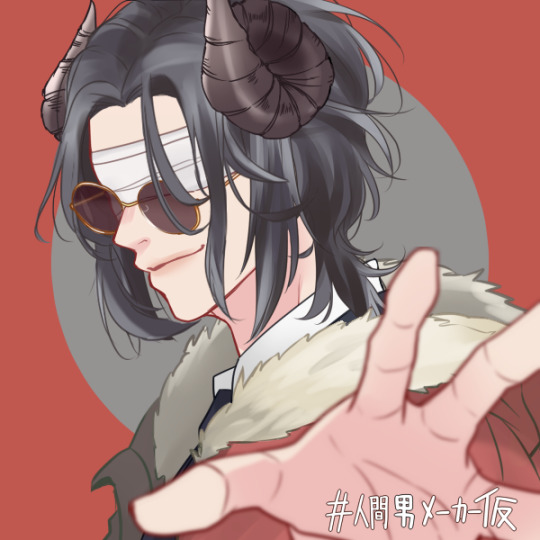
Zalgo
He's a demon and the personification of fear, inspired in the creepypasta of the same name, Zalgo
He covers his eyes because when people outside his dimension of chaos stare at him, start crying and shaking in fear extremely traumatized
He gets along with Diavolo, met his dad, Barbatos is his best friend and Lucifer doesn't trust him at all
Jujutsu Kaisen

Kiyoshi Hira
Yes the same picture of my profile picture without the cat ears is a JJK OC
Masamichi Yaga's best friend, Kiyoshi isn't a sorcerer or part of the Jujutsu world because he doesn't get along with the people in charge
Kiyoshi hates Gakuganji, Gojo is afraid of him, Kiyoshi had a wife but died because of Gauganji. Yamato is the name of Kiyoshi's only son
His cursed technique makes him able to control cursed energy just by talking, murmuring and screaming. He can extract cursed energy, absorb it, make it part of other living things, and can communicate with cursed spirits and all of it– Uh he almost destroyed the world one time but can't see in one eye and half of his body is paralyzed because of an accident
#adopted parents council#adopted parents council asks#makoto dazai#kiyoshi hira#jjk ocs#bsd ocs#obey me oc#ocs#b. a. d.#m. m.#real life authors#picrews
8 notes
·
View notes
Text
George angst Saturday
@redrose-arrow in case you might appreciate this
-
George knew that it was natural life cycle when people left and moved on with their lives. Will became a ranger, going on missions that took him all over the world. Jenny set up a restaurant in Wensley. Horace? Horace now lived at castle Araluen. It made George sad, thinking about how much their paths diverted, after all, they used to be inseparable, all five of them. Even despite all that had gone between Horace and Will back then, and even though George never spoke much, those other four kids were only people he had. And he knew, that he was also one other four people they only had. It was comforting, to remember their bond, because he knew that as war orphans, they probably wouldn't get far in life. But now look at them, Will and Horace heroes of the nation, Jenny cooking legend of Redmont and Alyss-
Alyss. His friend. With everyone else gone, only two of them remained at Redmont castle. It was always nice and refreshing to go for a walk with Alyss. Sometimes they would end up in the Ward yard, sitting under the old tree. And that's where George's feet took him now too. He looked around and in his head he saw five little kids running around, carefree of all worries what future years would bring. No Choosing day, no war.
"I miss us." He said. "I miss the five of us, being together."
Days ago, Alyss would maybe agree, maybe tell him that it's not all lost. But today, that was a lie. Because only thing that resounded in the air were bells of Courier's funeral and with cruel hand gripping his heart was the certainty that it was now indeed all gone.
-
Also I would like to remind y'all that there's theory that RA books are extraction from chronicles that George wrote. Imagine the dude, being last alive out of five of them. Writing the chronicles because that's the only way they can stay with him for little longer. He wrote them until his death, so he would never be alone.
47 notes
·
View notes
Text
Three Families Divide Jin
This was intended to be a translation of the first part of the Tongjian jishi benmo通鑑紀事本末 ("Comprehensive Mirror Chronicling Affairs from Beginning to End") which is a rearrangement of the Zizhi Tongjian into topics rather than a strictly chronology done by Yuan Shu (1131-1205) . However I quickly realized that for this particular topic there is no rearrangement done, as the ZZTJ after starting the chronicle in 403 BC with the elevation of Wei, Zhan and Han immediately launches into an extended retrospective. So I guess it's actually just a translation of the beginning of the ZZTJ. I have reluctantly decided to skip Sima Guang's long commentary at the start, and after the death of the Elder of Zhi in the interest of actually completing anything. Note that "Han" here refer throughout to the Warring states era state of Han韓 rather than the later Han漢 empire.
Three Families Divide Jin
23rd Year of King Weilie of Zhou [403 BC], began to instruct Jin's great men Wei Si, Zhao Ji, and Han韓 Qian to be Marquises.
Earlier, Count Xuan of Zhi wanted to use Yao as heir. Zhi Guo said:
He is not as good as Xiao. That which people find worthy with Yao are five, that which he does not match up in is one. His beautiful temple-hair, his tallness and large size are admirable. That he shoots and drives with the strength of his feet is worthy. That his skill and craft are fully provided is worthy. That his artful writings are articulate and graceful is worthy. That he is strong, resolute, decisive and daring is worthy. It is like this, but he is extremely inhumane. In case he used his five worthy qualities to climb past people, but uses his inhumaneness to act against them, who would be able to treat with him? If in the end [you] install Yao, the Zhi lineage will surely be wiped out.
He did not listen. Zhi Guo separated from the family with the Grand Scribe, and became the Fu clan.
[Wei Zhao says: Count Xuan of Zhi was the Jin dignitary Xun Li's son, Shen. Yao was Count Xuan's son, [known as] the Elder of Zhi. His posthumous title was Count Xiang. Zhi Gao was a kinsman of the Zhi clan. Xiao was Count Xuan's common-born son.]
Among Count Jian of Zhao's sons, the elder was called Bolu and the younger Wuxu. He wanted to set up the heir, nu did not know who should be installed. He therefore wrote a speech with teachings and admonishing in two letters, and gave them to his two sons, saying:
Vigilantly familiarize yourself with it!
After three years, he asked about it. Bolu and not been able to study his speech. He demanded his letter, but he had already lost it. He asked Wuxu, he recited his speech with great practice. He demanded his letter, he produced it from within his sleeves and laid it before him. And so Count Jian considered Wuxu to be worthy, and installed him as heir.
Count Jian sent Yin Duo to be at Jinyang. He inquired, saying:
Use it as silk from a cocoon? Or use it as a protecting shield?
Count Jian said:
A protecting shield!
Yin Duo reduced the number of his households. Count Jian spoke to Wuxu, saying:
If the state of Jin has difficulties, regardless of Yin Duo being of little importance, and regardless of Jinyang being far away, be sure to use is as somewhere to return to.
[Hu Sansheng says: “To extract the people's vital bounty is like pulling a silk thread from a cocoon.”]
When Count Xuan of Zhi passed, Count Xiang of Zhi had the government. He feasted Count Kang of Han and Count Huan of Wei at Lantai. The Elder of Zhi made fun of Count Kang and insulted Duan Gui. Zhi Guo heard about it, and admonished, saying:
If a ruler does not prepare against difficulties, difficulties will surely arrive!
The Elder of Zhi said:
Difficulties will be due to me. I will not be in difficulties, who would dare to raise them up!
He replied, saying:
Not so. The Book of Xia has this: “One man makes three mistakes, will his enemies be made clear? The unseen must be planned for.” In all cases the Lordly Man is able to pay attention to small things, and for that reason he has no large worries. Now the ruler in a single feast then has shamed a lord of men and his minister. Again to not make preparations but say “they do not dare to raise up difficulties”, nothing then is impossible. If black flies, ants, wasps and scorpions are all able to injure a person, then how much more a lord and his minister.
He did not listen.
The Elder of Zhi requested land from Count Kang of Han. Count Kang intended not to give it. Duan Gui said:
The Elder of Zhi is fond of gains and is headstrong. If we do not give it, he will attack us. It is not as good as giving it. That one is accustomed to obtaining land, and will surely request it from other people. [If] other people will not give it, he will surely turn against them with troops. Afterwards we will obtain our escape from worries and wait for a reversal in affairs.
Count Kang said:
Good.
He sent messengers to bring a town of ten thousand families to the Elder of Zhi. The Elder of Zhi was pleased. Again he demanded land from Count Huan of Wei. Count Huan intended not to give it. Ren Zhang said:
What is the reason for not giving?
Count Huan said:
He has no reason to exhort land is the reason for not giving.
Ren Zhang said:
He has no reason to exhort land, the various great men will surely be afraid. Us giving him land, and the Elder of Zhi will surely be haughty. When that one is haughty, he will make light of his foes. When these are afraid, they will be affectionate with each other. Use troops of those affectionate with each other and wait for a person to make light of his foes, and the Zhi clan's lifespan will surely not be long. The Book of Zhou says: “If you want to defeat him, you must for the moment assist him. If you want to take from him, you must for the moment give to him. What the ruler [said] is not as good as giving it to him, and so make haughty the Elder of Zhi. Afterwards we can chose who to make contact with and make plans against the Zhi clan. What recourse is there in for us alone to be the Zhi clan's target!
Count Huan said:
Good.
Then he gave him a town of ten thousand families.
The Elder of Zhi also demanded the lands of Cai and Gaolang from Count Xiang of Zhao [i.e. Wuxu who had succeed his father, Count Jian.] Count Xiang did not give it. The Elder of Zhi was angry, and led the forces of Han and Wei to attack the Zhao clan. Count Xiang wanted to set out, and said:
Where can we flee?
His followers said:
Changzi is nearby, moreover the walls are thick and complete.
Count Xiang said:
The people exhausted their strength completing them. To also be wrecked and die defending them, who of them will be with us!
The followers said:
Handan's granaries and armouries are full
Count Xiang said:
[We] extracted the people's vital bounty to fill it. Also because of that to kill them, who of them will be with us! Those at Jinyang belonged to the Previous Ruler and were treated generously by Yin Duo. The people will surely be agreeable.
Therefore he fled to Jinyang.
The three families used the people of the state to besiege and flood him, that of the city walls which was not immersed measured three ban [3 ban = 6 chi]. They submerged stoves to produce frogs, and the people had no rebellious thoughts. The Elder of Zhi went to the water. Count Huan of Wei steered and Count Kang of Han was on his right side in the carriage. [A traditional chariot had a crew of three. The noble, the driver, and the bodyguard on the right.] The Elder of Zhi said:
I have now learned water can be used to destroy a person's state.
Count Huan elbowed Count Kang. Count Kang trod on the back of Count Huan's foot. By using the Fen River he could flood Anyi, and with the Jiang River he could flood Pingyang.
Xi Ci spoke to the Elder of Zhi, saying:
Han and Wei are certain to turn against you.
The Elder of Zhi said:
My Count, how can you know that?
Xi Ci said:
It is due to people's affairs [I] know it. In all cases troops from Han and Wei have been used to attack Zhao. When Zhao perishes, the difficulties are sure to reach Han and Wei. Now the pledge is to win against Zhao and then divide its land into three. The walls that are not immersed measures three ban. People and horses eat each other. The city will surrender within days, yet the two Counts have no joyful resolve, but have an anxious appearance. If they are not turning against you, then why?
Next day, the Elder of Zhi reported Xi Ci's words to the two Counts. The two Counts said:
This is a case of a slanderous person intending to be the Zhao clan's wandering persuader, making the ruler be suspicious of the two families and negligent in the attack on the Zhao clan. If not so, why in that case are the two families not profiting from morning to evening by dividing the fields of the Zhao clan, but intend to be in precarious difficulty in an affair with no possibility for success!
The two Counts went out. Xi Ci entered and said:
Why did my ruler report your subject's words to the two Counts?
The Elder of Zhi said:
Sir, how did you know that?
He replied, saying:
Your subject saw them looking at your subject in particular, and then scurried away, and [I] knew your subject had obtained their feelings.
The Elder of Bo did not make amends, and Xi Ci requested to be sent to Qi.
Count Xiang of Zhao sent Zhang Mengtan to furtively go out and see the two Counts. He said:
Your subject has heard that when the lips are gone, the teeth are cold. Now the Elder of Zhi leads Han and Wei to attack Zhao. When Zhao is destroyed, Han and Wei will be next.
The two Counts said:
In our hearts we know that it is so. [We] fear if the affair is not be carried out when the plan leaks, then the calamity would become extreme.
Zhang Mengtan said:
The plan goes out from the two Counts' mouths, and goes in your subject's ears. What is the harm!
The two Counts therefore furtively made a pledge with Zhang Mengtan, that on the appointed day they would dispatch [their forces]. Count Xiang sent people at night to kill the functionary who guarded the dikes, and then breach the water to flood into the Elder of Bo's army. The Elder of Bo's army put a stop to water but was in disorder. Han and Wei flanked and then struck them, Count Xiang commanded his solders to assault them in front. They greatly defeated the Elder of Bo's multitudes, and thereupon killed the Elder of Bo and entirely wiped out the members of the Zhi clan. Only Fu Guo survived.
The three families divided the fields of the Zhi clan. Count Xiang of Zhao lacquered the Elder of Zhi's head, and used it as a drinking vessel. The Elder of Bo's subject Yu Rang wished to get revenge on him. He therefore pretended to be a punished criminal, tucked a spoon-head dagger, and entered within Count Xiang's palace to plaster the lavatory. Count Xiang went to the lavatory, felt his heart race. He search it and captured Yu Rang. His left and right wished to kill him. Count Xiang said:
The Elder of Zhi died without descendants, and yet this person wishes to revenge him, truly a right-principled gentleman. I will respectfully release him, and that is all.
He therefore let him go. Yu Rang again lacquered his body to become leprous, and swallowed charcoal to become mute. He went to beg at the market, his wife did not recognize him. He went to see his friend. His friend recognized him, and he began sobbing at him, saying:
Due to Sir's talents, [if you were] to serve Zhao Meng as a subject, [you] would surely obtain affection and favour. Sir would then have what [you] wished to have, would that not be easy? Why then make yourself miserable like this? The search for vengeance, would not also be difficult!
Yu Rang said:
Then [I] would have given my pledge as a subject while also seeking to kill him, this is to have two hearts. Overall, what I am doing is extremely difficult, that is all. However, what I am doing perhaps might shame those in later generations Under Heaven who are subjects with two hearts in their breasts.
Count Xiang set out and Yu Rang hid under a bridge. Count Xiang arrived at the bridge, and his horse startled. He searched it and got Yu Rang, and consequently killed him.
Count Xiang, because Bolu had not been installed, although he had five sons, was not willing to set up an heir. He ennobled Bolu's son at Dai. He was called Lord Cheng of Dai and passed young. He installed his son Huan as the Zhao clan's heir. Count Xiang passed, and his younger brother, Count Huan, expelled Huan, and installed himself. After one year, he passed. The people of the Zhao clan said:
Count Huan's instalment was not Ruler Xiang's idea.
Therefore they together killed his son[s]. They then welcomed Huan# and installed him. This was Count Xian. Count Xian begot Ji, this was Marquis Lie. Wei Si was the grandson of Count Huan Wei, this was Marquis Wen. Count Kang of Han begot Count Wu. Count Wu begot Qian. This was Marquis Jing.
Marquis Wen of Wei used the Bu Zixia and Tian Zifang as teachers. Always when he passed by the cottage of Duangan Mu, he was certain to bow toward the front crossbar [on his chariot]. Many of the Four Regions' worthy gentlemen reverted to him. Marquis Wen was dranking wine with the crowd of subjects. They were having fun but then it was raining. He called for his carriage, wanting to go out into the wilderness. Left and right said:
Today we are drinking and having fun, and the sky is also raining. Why would my lord go?
Marquis Wen said:
I had an appointment to hunt with the gamekeeper. Though we are having fun, how could [I] not meet with someone at the appointed time.
Then he left and and put a stop to it himself.
Han [wanted] to borrow a force from Wei to attack Zhao. Marquis Wen said:
This Orphan and Zhao are brothers. [I] do not dare to hear the instruction.
Wei [wanted] to borrow a force from Wei to attack Han. Marquis Wen responded to them in the same way. The two states were both angry and left. Later they understood Marquis Wen was reconciling them, and both came to court in Wei. Wei hence was first to be great among the Three Wei. The various feudal princes were unable to contend whit them.
9 notes
·
View notes
Text
books i'm thinking about reading sometime encountered this evening;
The Chronicle of Morea: Historiography in Crusader Greece
'The Chronicle of Morea, one of the most important and controversial historical narratives written in the late Middle Ages, tells the story of the formation and government by the Villehardouin dynasty of a remarkably successful Crusader State following the conquest by western invaders of the capital - Constantinople - and the provinces of the Byzantine Empire. By examining all the Chronicle's surviving Greek, French, Spanish and Italian versions, this study, the first of its kind, explores in depth the literary and ideological contexts in which the work was composed, transmitted and re-written. The result is a fascinating analysis of cultural exchange in a rich and vibrant eastern Mediterranean world where different ethnicities were obliged to live alongside each other, and outside political interests frequently intruded in dramatic fashion. Translations into English have been provided of all the material discussed.'
The Universal History of Stepʻanos Tarōnecʻi: Introduction, Translation, and Commentary
'The Universal History (Patmut'iwn tiezerakan) of Step'anos Taronec'i is a history of the world in three books, composed by the Armenian scholar at the end of the tenth century and extending from the era of Abraham to the turn of the first millennium. It was completed in 1004/5 CE, at a time when the Byzantine Empire was expanding eastwards across the districts of historic Armenia and challenging key aspects of Armenian identity. Step'anos responded to these changing circumstances by looking to the past and fusing Armenian tradition with Persian, Roman, and Islamic history, thereby asserting that Armenia had a prominent and independent place in world history. The Universal History was intended to affirm and reinforce Armenian cultural memory. As well as assembling and revising extracts from existing Armenian texts, Step'anos also visited monastic communities where he learned about prominent Armenian scholars and ascetics who feature in his construction of the Armenian past. During his travels he gathered stories about local Armenian, Georgian, Persian, and Kurdish lords, which were then repeated in his composition.'
Marcus Aurelius in Love; Marcus Aurelius and Marcus Cornelius Fronto. Edited, Translated, and with an Introduction and Commentary by Amy Richlin
In 1815 a manuscript containing one of the long-lost treasures of antiquity was discovered—the letters of Marcus Cornelius Fronto, reputed to have been one of the greatest Roman orators. But this find disappointed many nineteenth-century readers, who had hoped for the letters to convey all of the political drama of Cicero’s. That the collection included passionate love letters between Fronto and the future emperor Marcus Aurelius was politely ignored—or concealed. And for almost two hundred years these letters have lain hidden in plain sight.
The First Fossil Hunters: Dinosaurs, Mammoths, and Myth in Greek and Roman Time. Adrienne Mayor
Like their modern counterparts, the ancient fossil hunters collected and measured impressive petrified remains and displayed them in temples and museums; they attempted to reconstruct the appearance of these prehistoric creatures and to explain their extinction. Long thought to be fantasy, the remarkably detailed and perceptive Greek and Roman accounts of giant bone finds were actually based on solid paleontological facts. By reading these neglected narratives for the first time in the light of modern scientific discoveries, Adrienne Mayor illuminates a lost world of ancient paleontology
Ausonius: Moselle, Epigrams, and Other Poems
Ausonius provides translations of the key works of Ausonius, an important later Latin poet whose poems detail the social and cultural life of Gaul and its environment. His often difficult and playful Latin is presented in English by the award winning poet Deborah Warren, enabling a new generation of students to use and understand the poems. With notes and commentary throughout, this volume will be important not only as an example of later Latin poetry but also as a window onto the Later Roman Empire and the beginnings of early Christian writing.
3 notes
·
View notes
Text
Frozen Ashes: Chapter 7 - Blood in the Water II
Book 3 of The Calendula Chronicles.
Story synopsis: Albert Wesker molded his captive into the perfect, pliable bait for taking out Rockfort Island's paramilitary facility, and cracking open the Ashford family’s secrets. But who’s really in control, once chaos breaks out?
The stakes have never been higher for Marigold, but she may not be fast enough to save everyone.
Book 3 of the Calendula Chronicles series. Written as the other side of The Antarctica Incident.
Chapter summary:
Marigold violently expresses her feelings about the present situation.

Alfred leaned forward in his command room chair, rapt. Aunt Callie had told him to try to shine light in the man’s face - the one who was running the mission. Why did he look so familiar? Unimportant. The crows, while infected, had retained some small part of themselves, and that flock mentality strengthened that. There was no audio, but it seemed that they’d even retained some level of generational memory to say the magic words that often got them food.
Auntie Marigold had laid out her bait, and the commander had gone straight for it, watching the digital timer that Marigold had activated on starting down the track.
It was probably for the best that they’d recorded Marigold’s average time that summer in 1981, rather than her best. The men had trouble enough believing that the top time was real as it already stood. She was moving through the course more quickly than normal, somehow, but there was a careful precision that suggested she was trying to do so quietly. Compared to the USS candidates that had bloodied themselves on the course over the years, it was like watching a spider monkey move through a tree.
The commander straightened up with one of the emergency injectors specifically formulated for Marigold in his hand. His brow creased, puzzling something out.
The man stood a mere six inches in front of a brick surface that Marigold had slammed into deliberately a dozen times before, in an effort to not damage the outer walls of the yard itself. His father and old Scott Harmon had hated seeing her use it - they’d calculated the force once between the two of them and come up with grim expressions - but it was effective, and Callie’s cracked ribs always healed rather quickly on landing. She’d learned to land better over the years.
A runway of rebar had been scattered and driven into the soil between the finish line and the wall itself. How much force, Alfred wondered, did it take to pulverize a man standing in that place, when his Aunt Callie drove herself into it this time?
If Aunt Callie was trying to make up for lost birthdays, this was a wonderful place to start. Alfred’s grin was unsteady, but it was also merciless. He was about to bear witness to a slaughter.
----------
Marigold began to rise from her crouch on the high steel perch she had claimed, forty feet up. The Kevlar vest had hindered her flexibility a bit- she’d always done this run in athletic gear and little else- but she was glad to have it now. Ahead of her was a clear path to the finish line. Wesker had dismissed the idea that the crows would attack them in favour of getting a better look at the injector she had “hidden” in a gap in the wall.
It would pique his interest, of course. The idea that years of secret, independent viral research existed, well ahead of Arklay had clearly been a burr in his brain since he had started dropping her nephew’s name into his line of questioning, all those months ago. The sudden slip-shift change in their dynamic had tamped down on these, but he was always going to come after them, here. She’d worked hard to appear accommodating, as much as seemed plausible, while revealing…almost nothing, save from what they could extract from recordings and her body.
That ended, now. The moment she had climbed out of that sandbag shelter, that outcome had been confirmed beyond a reasonable doubt.
The air up here was cool, with a slight breeze. A mere moment and an eon ago, she’d found this little perch while the family crowded down below. The twins had barely been eleven at the time. Now the island was a war zone, and the cause had been lined up perfectly below, so long as she could take that final step.
Marigold shifted her leg into a bracing stance, moving the other foot the other down to press against the front of the girder. Her focus shifted to a crossbar about fifteen feet below and in front of her.
She kicked off the girder as hard as she could, and launched herself down towards her target.
----------
As the seconds changed between 1:48 and 1:49, a pressure lifted in Albert Wesker’s head, and he looked up.
Those tiny eyes were everywhere. Waiting.
Because they had an ingrained expectation to be fed.
The sound of a sharp footfall came from behind him, and the numbers froze at 1:49. He turned, suddenly fully alert for the first time since entering this yard. Marigold had touched down, had ripped a piece of rebar up from the dirt, and was rocketing toward him with murder in her suddenly all too clear eyes.
She’d led him right into a trap, and it was now snapping shut around him.
He barely had time to brace himself when she spun at the last instant and put her shoulder into his diaphragm, knocking the wind out of him while punching them both through the bricks behind him. The shock of the moment was such that he barely felt the rebar pierce his guts before he landed on his back in the rubble. The birds took flight, squawking indignantly.
He felt the second one, though.
And the next three, piercing his shoulder and biceps when he instinctively attempted to reach for his gun. The crows were getting louder, and drawing closer.
They were hungry, he thought distantly. He bucked up, trying to gain some leverage to force the steel from his shoulder, trying to free one of his arms. Another piece of steel joined it in his shoulder, and thin, steel fingers hooked their way under his sternum with an almost gentle pull, and then everything transmuted to pain.
I told you to leave my family out of this, her cold voice came through in his head.
When the teeth closed over his windpipe, that delicate little hand pushing his chin back as the bloodlust took over the woman on top of him, his vision began to fade to black, and he finally felt nothing at all.
----------
Marigold snapped back to awareness as Wesker passed out under her. After breaking through the little wall like a battering ram, the impact had done little more than slightly stun the man. She had planted herself on his torso, and stabbed every piece of rebar within reach into and through him, pinning him to the ground like an insect in a collection. She’d used their connection to divert his attention, but the pain feedback had driven her into a violent frenzy.
She didn’t clearly remember doing all of this.
Somehow, those fucking glasses were still on his face, although now somewhat askew.
There was blood in her mouth. On her mouth. Not hers. Looking down, she realized she had clamped down on his throat like a large, angry cat suffocating its prey. The wound on his throat was already closing, but the other wounds…Wesker had lost an awful lot of blood. Could anything survive this?
Then she remembered the scar tissue on his chest. This would barely slow him down, once he broke free. Worse, he’d seen for himself how she managed to follow through once the first spike of adrenaline had passed.
Next to her, a crow cawed quietly, almost reticent. Scavengers. At some level, she’d known the problem.
Beneath her, Wesker coughed. Marigold rolled off of him and spat the blood from her mouth. His radio was still clipped to his vest, somehow intact. The headset was lying crushed several feet away, and the voice of one of the soldiers was coming through. “Sir, we’re in position. Ready to move on your word.”
“Are you, now,” Marigold murmured, and unclipped the radio, tossing it lightly down the track. Wesker was beginning to wake, beginning to feel pain again, and the rebar began to move as he attempted to fight his way up.
Stay down, she directed at him with as much force as she could muster, and he collapsed back down, panting from the strain and watching her with mounting fury. You, was all he seemed able to manage. The venom in the word conveyed enough.
“Me,” she agreed, voice soft. She wouldn’t be able to hold on for long. You threatened my family. You had your warning. What did you expect? There was a note in her voice that seemed almost sad when she spoke aloud. “This couldn’t have gone any other way.”
She looked up at the camera- it had rotated to follow them through the wall - and signed to Alfred. I can’t hold him for long. Garden. Now. Find something to cover your head. We have to go.
Her hands were beginning to shake again. Stumbling over to the sign, she peeled the sign back once more and extracted the remaining doses, taking one and storing the remaining three in her vest. It would have to be enough to tide her over for a while.
----------
Wesker watched this with pain-hazed eyes, a suddenly passive observer. Then, the patience of the murder of crows around him finally broke, and he had much more immediate problems to worry about.
#frozen ashes#calendula chronicles#marigold ashford#albert wesker x oc#well maybe they're on a break now?
2 notes
·
View notes
Photo

The Dawn of Yangchen by F.C. Yee
From the New York Times bestselling author of Avatar, the Last Airbender: The Rise of Kyoshi and Avatar, the Last Airbender: The Shadow of Kyoshi comes a thrilling new chapter in the Chronicles of the Avatar series
Yangchen’s inexperience may prove to be her greatest asset . . .
Plagued by the voices of Avatars before her for as long as she can remember, Yangchen has not yet earned the respect felt for Avatar Szeto, her predecessor. In an era where loyalty is bought rather than earned, she has little reason to trust her counsel. When Yangchen travels to Bin-Er in the Earth Kingdom on political business, a chance encounter with an informant named Kavik leads to a wary partnership. Bin-Er is a city ruled by corrupt shang merchants who have become resentful of the mercurial Earth King and his whims. To extract themselves from his influence, the shangs have one solution in mind: a mysterious weapon of mass destruction that would place power squarely in their hands. As Yangchen and Kavik seek to thwart the shangs’ plan, their unlikely friendship deepens. But for Yangchen to chart her course as a singularly powerful Avatar, she must learn to rely on her own wisdom above all else.
This propulsive third installment in the Chronicles of the Avatar series illuminates Avatar Yangchen’s journey from uncertain young woman to revered leader.
https://www.goodreads.com/book/show/58667490-the-dawn-of-yangchen?ref=bk_bet_out
********
July 25, 2022
My Review: 5/5 Stars
When we meet Avatar Yangchen back in Aang's story in Avatar the Last Airbender, Aang is seeking Yangchen's advice as a fellow airbender Avatar on how to follow your Air Nomad teachings even as the Avatar. And Avatar Yangchen says, "Selfless duty calls you to sacrifice your own spiritual needs and do whatever it takes to protect the world." I kept thinking about this quote and how Yangchen truly believed this based on her actions in this story. So let me back up. The beginning of this story shows glimpses of a young Yangchen. Fellow Avatar fans know, that an Avatar learns of their identity when they are sixteen. Typically. But we know that isn't always true. Aang overheard the monks and learned when he twelve who he was and ran away that night. While Korra had the affinity of almost all the elements when she was about four and knew exactly what that meant. For Yangchen, it wasn't so simple. She had something we haven't seen. Her past lives are constantly in her mind. Talking and talking and talking to the point where as a child, it was the most painful experience for her and she had no idea what was happening. All their experiences coming at her and the only way to stop the voices was for someone to figure out which Avatar was currently talking and find the works of companions or something she was muttering under her breath to bring her back to reality. Yangchen also has more of an affinity when dealing with the spirits and the Spirit World. She may not have realized who she was when she was a child right away, but the incidents lead her to learning early. This shaped who she becomes.
In this book, Yangchen is seventeen and has already dealt with some issues and is proving to be a powerful Avatar even at a young age. But there is always work to be done. And her current work is about helping the city Bin-Er before some sort of weapon arrives. It means recruiting Kavik, a waterbender who has no side and revealing that this Avatar knows what it means to play the game she hates. How to build a network and have spies and be one herself. So back to her quote to Aang. She realizes that she cannot be this true Air Nomad. Her teachings and sense of identity as an Air Nomad can go only so far since she is the Avatar. She will learn that to achieve your goals and find the peace you wish to bring, will require sacrifice and you can only take so much of the brunt.
I really enjoyed this story! Yangchen was a surprise despite knowing that one quote from her. I didn't expect her to be so sneaky and intelligent in that world of deception. But she is strong and brave and loyal and willing to help others no matter the cost to her own life. And then we have Kavik. He was another great character though you can see his struggle of being basically forced to be Yangchen's spy. He wants to help his family and he'll make his own sacrifices before truly realizing who he is. Great story overall. Lots of twists and turns. And even more head nods to many, many things we have seen in the Avatar world. It's fun to see things we know from Aang's time and realize it goes very far back. That these things existed even then. I couldn't put the book down. And with that bit of a cliffhanger at the end of this story, I am definitely looking forward to more of Avatar Yangchen and her companions.
#book#books#i love books#my review#book review#avatar the last airbender#the dawn of yangchen#fc yee#avatar#aang#avatar aang#fire nation#earth kingdom#water tribe#air nomad#yangchen#avatar yangchen
11 notes
·
View notes
Text
Banu Qasi triology: Locations (+ Maps extracted from the book and modern reconstruction of plans of some cities of that period of time I found on Internet)
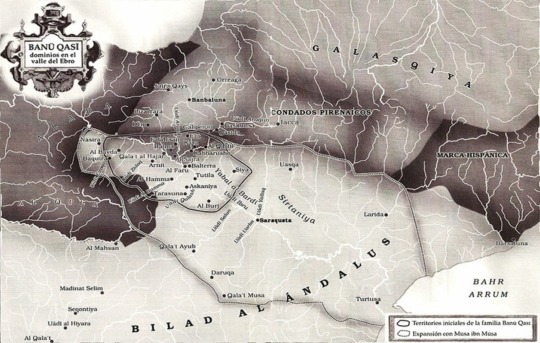


(* Some towns and cities that already existed are not in this maps, but probably were not included in the maps because maybe they're not relevant for the story, X, X, X )
Zaragoza (×) (although this one represents the Zaragoza from 11th century, due to the presence of the Palace of Aljaferia (×), although a watchtower existed since 9-10th centuries in that place, the Troubadour's Tower, that currently forms part of the palace)
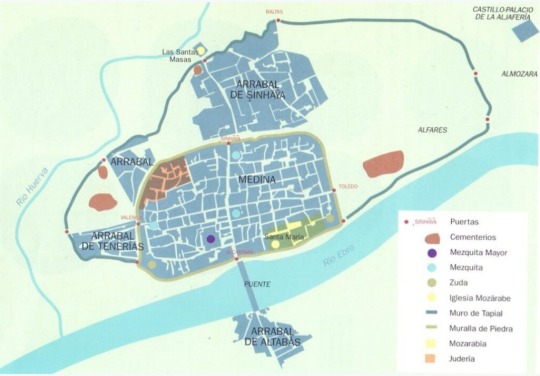
Tudela, but here's a video of Pamplona/Iruña
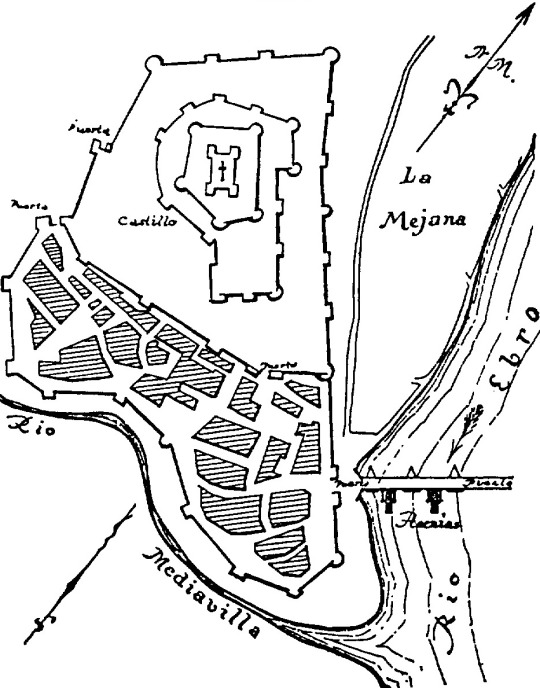
Córdoba (Here's a video with the current-day Alcázar and the Caliphal baths)
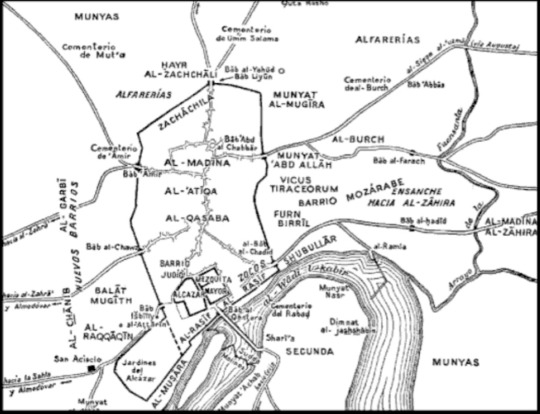
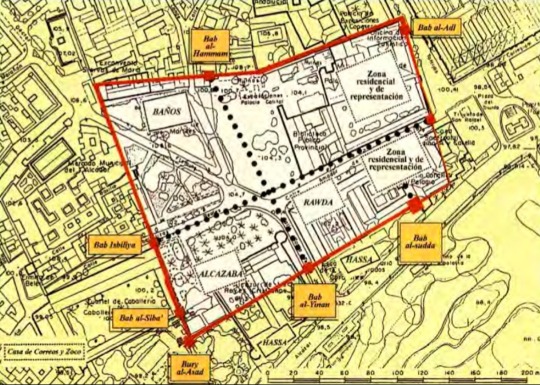

Toledo
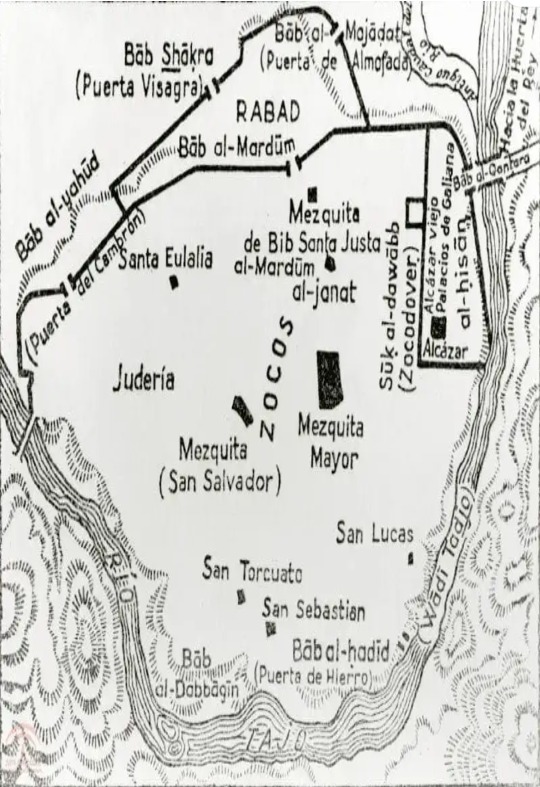
Alaba: Álava
Al Bayda, Albayda: Albelda
Al Burj: Borja
Al Busherat: Las Alpujarras
Al Faru: Alfaro
Al Garb: 'the west', Algarve
Al Hamma: Alhama
Al Hamma: site that corresponds to the current Baños de Fitero
Al Hamra: 'the red', the Alhambra of Granada
Al Lura: Álora
Al Maghrib: current Maghreb area, Morocco, Algeria and Mauritania
Al Mahdiyya: capital of the Fatimid Caliphate founded by Al Mahdi
Al Mariya: Almería
Al Mahsan: Almazán
Al Mudawar: Almudévar
Al Munastir: Almonacid
Al Qala't: Alcalá de Henares
Al Qāhira: Cairo
Al Qastil: Carcastillo or Murillo el Fruto
Al Qila: Castile
Al Qulaiya: Alcolea
Al Qubba: Talavera
Al Rawda: one of the interior gardens of the alcazar of Córdoba, where most of the emirs were buried
Al Sarqiyya: Axarquía, in Granada
Al Xaraf: Aljarafe
Al Jazira: Algeciras
Almunya de Aisha: Muniesa
Al Sajra: Azagra
Antaqira: Antequera
Arnit: Arnedo
Aryiduna: Archidona
Askaniya: Cascante
Asturqa: Astorga
Asnad:Cenes
Astīban: fortress located in the current-day Alhambra
Aura: Fortress next to Barcelona, possibly in present-day Valldaura
Aybar: Aibar
Bab al Qantara: the Bridge Gate, in Córdoba, also known as Bab as-Sudda or the Azud Gate
Baghdad: capital of the Abbasid emirate
Bagúh: Priego
Bahr Algarbí: Atlantic Ocean
Bahr Arrum: Mediterranean sea
Balaga: Balager
Balma: place located on the left bank of the Ebro river next to Calahorra, it may correspond to the town of San Adrián
Balansiya: Valencia
Balterra: Valtierra
Bambaluna: Pampiluna, Pamplona
Banu Basir: Benameji
Baquira: Viguera
Barbitaniya: región of Sobrarbe, that included Jaca, Barbastro and Boltaña
Barsaluna: Barcelona
Baskunsa: place name that would correspond to the fortress of Rocaforte, which after the Reconquest, it would give to the current Sangüesa, located at the foot of this valley
Batalyus: Badajoz
Barbastur: Barbastro
Bayanna: Baena
Bayāna: Pechina, important trading city of the Mediterranean sea, replaced by the port of Almería
Basta: Baza
Bilad al Ándalus: Hispania
Bulāy: Poley, Aguilar de la Frontera
Burbaster: Bobastro, Umar ibn Hafsún's shelter
Cantabria: mountain range that borders river Ebro by the north, next to Logroño
Castro Muros: San Esteban de Gormaz
Dar al Islam: the lands of Islam
Dar al Rahn: the House of Hostages, in Córdoba
Daniya: Denia
Daruqa: Daroca
Deio: Monjardín
Dus Amantis: the Rock of the Lovers
Falah'san: Falces
Fās: Fez, capital of the Idrisi emirate
Finyāna: Fiñans
Galaskiya: Land of the galaskiyun, the gascons
Galipenzo: Gallipienzo
Garnata: Granada
Girunda: Girona
Hardaris: Ardales
Hisn Asar: Iznájar
Hisn Qámara: castle of uncertain location, near Colmenar and Casabermeja, in the province of Málaga
Hisn Qastuluna: the ancient Roman city Cástulo, in Jaén
Iacca: Jaca
Ifriqiya: Tunisia
Ilbira: Elvira, next to Granada, capital of the distrit with the same name.
Isbāniyā: Christian chroniclers called the peninsula as a whole Hispania. For the Arabs, Al Ándalus is only the land dominated by Islam. They call the Christian land by the name of their kingdoms, and the term Isbāniyā is reserved for the entire peninsula, although it is rarely used.
Ishbiliya: Sevilla
Istiba: Estepa
Istiya: Écija
Kabbaruso: Caparroso
Kara: Santacara
Larida: Lleida
Ledena: Liédena
Leqant: Fuente de Cantos
Liyun: León
Lizarrara: Estella-Lizarra
Madinat Selim: Medinaceli
Madinat al Faray: Guadalajara
Malaqa: Málaga
Mārida: Mérida
Martus: Martos
Milīla: Melilla
Millas: Mijas
Muish: Muez
Munt Sun: Monzón
Munt Liyūn: Monteleón
Mursiya: Murcia, also known as Tudmir (this name comes from the Visigothic count Teodomiro, who ruled it by the time the Muslims arrived to the Peninsula)
Nasira: Nájera
Niebla: District that corresponds to the current-day province of Huelva
Orreaga: mountains of Ibañeta or Roncesvalles
Ossa: Huesa del Común
Qabra: Cabra
Qabtil: Isla Menor (Sevilla)
Qadis: Cádiz
Qala't al Hajar/Qalahurra: Calahorra
Qala't al Hans: Alange
Qala't Gazuan: Alcalá de Guadaira
Qala't Ayub: Calatayud
Qala't Musa: Calamocha
Qala't Rabah: Calatrava
Qarmuna: Carmona
Qarqar: Cárcar
Qasida: Cáseda
Qarcastil: Carcastillo
Qasr Bunayra: Casarabonela
Qayrawán: Kairuán, capital of Ifriqiya, current-day Tunis
Quluniya: Clunia
Qumaris: Comares
Quriya: Coria del Río
Qurtuba: Córdoba
Qustantaniyeh: Constantinople
Qutanda: Cutanda
Raya: district that corresponds to the province of Málaga
Rasif: A promenade in Córdoba that ran along the right bank of the Guadalquivir river
Resa: fortress located on the banks of the Ebro, near the mouth of the river Arga
River Eiroca: River Iregua
River Iberus*: River Ebro
*the Iberian peninsula takes its name from the river Iberus/Ibero, the river Ebro
Rumiya: Rome
Sabta: Ceuta
Salubāniya: Salobreña
Santabariyya: Santaver, Muslim district that corresponds to the province of Cuenca
Saqunda: village in the suburb of Córdoba, on the left bank of the Guadalquivir river
Sajra Qays: Qays rock, fortress located near the current-day town of Huarte Araquil, in the Rock of Echauri, northwest of Pamplona
Saraqusta: Zaragoza
Seqontiya: Sigüenza
Siduna: Medina Sidonia
Sirtaniya: La Cerretania, in the Aragonese area of the Pyrenees, around the valleys of the Gállego and Cinca rivers. This denomination disappears from the sources from the 10th century, when the County of Aragon appears
Siya: Ejea de los Caballeros
Suhayl: Fuengirola
Sumuntān: Somontín
Tahert: city in the north of Africa, in Algeria
Tahust: Tauste
Takurunna: one of the corias of Al Andalus, with capital in Ronda
Tarraquna: Tarragona
Talyayra: fortress located below Bobastro, over the Guadalhorce river.
Tarasuna: Tarazona
Tāy^ula: Tíjola
Tulaytula: Toledo
Turtusa: Tortosa
Tutila: Tudela
Uādi al Hamma: River Alhama
Uādi al Hiyara: Guadalajara. At first, the name of rhe city was Madinat al Faray, but later it adopted the old name of the river Henares
Uādi al Jurs: River Guadalhorce
Uādi al Kabir: River Guadalquivir, 'the big river'
Uādi al Walid: Valladolid
Uādi Anna: River Guadiana
Uādi Aragun: River Aragon
Uādi Aruad: River Arga
Uādi Cinqa: River Cinca
Uādi Duwiro: River Duero
Uādi Eyroqa: River Iregua
Uādi Ibru: river Ebro, and by extension, the Ebro valley. (Also known as Uādi Abro or Uādi Ibro)
Uādi 'Ís: Guádix
Uādi Nahar: River Henares
Uādi Qalash: River Queiles
Uādi Salit: River Guadacelete
Uādi Salún: River Jalón
Uādi Sanyil: River Genil
Uādi Tadjo: River Tajo
Uādi Uarba: River Huerva
Uādi Urbiqo: River Órbigo
Uādi Yallaq: River Gállego
Uādi Zidaq: River Cidacos
Uakhshama: Osma
Uasqa: Huesca
Ubbada: Úbeda
Uksunuba: Faro (Portugal)
Ulit: Olite
Uriyuwala: Orihuela
Ushbuna: Lisboa
Vareia: Varea
Welba: Huelva
Yabal al Bardi: Las Bardenas Reales, in Navarra
Yabal Sulayr: the mountains of the Sun, Sierra Nevada
Yabal Tariq: 'the mountain of Tariq', Gibraltar
Yayán: Jaén
Yilliqiya: Asturias (and by extension, Galicia). It's also writen as Illiqiya or Gilliqiya.
Yussana: Lucena
Etymology II Characters
2 notes
·
View notes
Photo
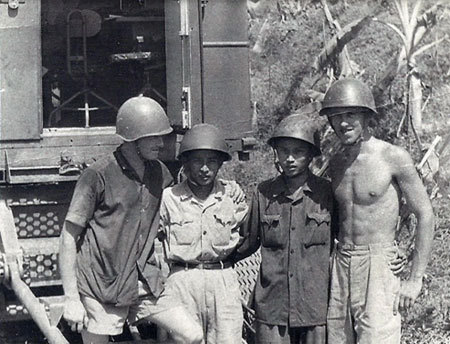
I just picked up an old paperback copy of a Vietnam War book called SEALs: UDT/SEAL Operations in Vietnam by Tim Bosiljevac. The book chronicles the early history of the Sea, Air and Land Teams, from their founding under President Kennedy through the end of the Vietnam War. The SEALs were created to be the Navy’s superhuman version of the Green Berets: “a naval guerrilla/counterguerrilla [force] with an emphasis on direct action raids and missions on targets in close proximity to bodies of water.” I love that line, “in close proximity to bodies of water.” That could mean a puddle…or hell, when you consider that human beings are about 70% water–“bodies of water” could mean just about anything.
There are a lot of great Vietnam War books out there, mostly memoirs, as Dr. Dolan explained:
Virtually anyone who saw combat and has a decent memory can write a decent book about it — and Vietnam, a war characterized by thousands of small skirmishes, was richer in incident and gore than an inner-city basketball tournament. When next you hear that rough voice asking, “War — what is it good for?”, you tell it: “First-person memoirs, that’s what!”
…This high literary output was a delayed gift of the utter lack of strategy which doomed the American enterprise in Vietnam: a war which consisted largely of sending small contingents of infantry out into the jungle to find the enemy, usually by getting ambushed, is bound to be a military disaster — but equally bound to produce an extraordinary number of fantastic combat tales.
Unfortunately SEALs lacks this first-person immediacy–it’s a third-person history, Bosiljevic’s Navy College master’s thesis turned into a book, and unfortunately it sometimes reads like a thesis.
Still, this is Nam, Dude–and we’re talking about the SEALs here. That means page after page of ambushes and skirmishes, some of which make for some pretty amazing reading, even in the third dry person.
One such ambush stuck out–one of those rarely reported, long-rumored showdowns between our guys and the hated, invisible “Russian advisors” who were never officially supposed to be there in South Vietnam.
ou kids out there who were born too late to remember the Cold War grudges probably won’t grasp the profound satisfaction that a scene like this offers your average armchair Cold Warrior. See, one thing our side could never get over was griping about how the Soviets were somehow cheating. This scene is the sort of “This is what happens when the SEALs catch you cheating” fantasy that all the armchair Cold Warriors dreamed about. It takes place in 1967–a big year for the SEALs in ‘Nam–in a province in the southwest corner of South Vietnam. Meaning, Russian advisors were operating in our own backyard, the bastuds!:
One particular SEAL ambush in 1967 in Kien Giang Province provided a surprise to a frogman force. The SEALs had been watching a reported supply route used by enemy forces on a remote canal. Late in the afternoon of the second day of their surveillance, a VC sampan floated into the kill zone. Besides the two indigenous guerrillas onboard, a tall, heavy Caucasian with a beard rode in the bow. He was dressed in what looked like a khaki uniform and was holding a communist assault rifle. Just as the craft pulled into the area, the communists became leery, as if sensing the danger nearby. Although initially startled at seeing the white man, the SEALs immediately let the law of the barroom prevail–when a fight is unavoidable, strike first, and strike hard. The frogmen unleashed a hail of fire into the enemy force. The Caucasian was hit in the chest in the initial burst of fire and went overboard. The VC attempted to jump in and assist him. Just then, a superior Vietcong force appeared and counterattacked. Outnumbered and outgunned, the SEALs fought a running gun battle to an area where they could extract. Later, they were debriefed about the incident by an intelligence officer. They were told to remain silent about the action. South Vietnamese intelligence had reported that the white man had been a Russian. It would remain a little-known fact that the guerrillas and North Vietnamese were assisted in their Third World brushfire war by a host of foreign advisers and technicians, including Soviets, Chinese, Eastern Bloc, Cuban, Korean, and other communist nationals.
There’s a serious ethical contradiction that seems lost on the author here, a contradiction that’s built into our DNA: On the one hand, the SEALs (very wisely) attack and kill without warning on the barroom theory about striking first and striking hard. Which makes sense, but goes against the suburban middle-class rules of fighting. Real middle-class American bar fights go something like this: a lot of shouting, a lot of loud long well-telegraphed empty threats, even formal declarations marking the combatant’s geographical location (“I’m here! I’m here, mutherfucker!”), dramatic tearing off of one’s shirt, verbal commands expressed in the Imperative Mood (“Come on! Come on, mutherfucker!”)… All that pre-game shouting in American bar-fights establishes the combatant’s sense of “fair play” that suburbanites tend to vastly overrate. It’s as though everyone’s worrying about what the post-game highlights will look like, what they’ll say after the fight–about securing your place in history, or in the homecoming king vote. I dunno. I remember in Moscow in the mid-90s watching a Russian and an American go at it, and there couldn’t have been a bigger fight-culture clash: The American, some ripped red-head, went through the whole tearing his shirt off schtick, screaming and yelling about his geographical location, calling his Russian opponent all sorts of names implying that the Russian was a cheater whereas he wasn’t…It seemed ridiculous to everyone watching, especially the Russian guy, who tagged the redhead a few more times, messing up his Tony Award-winning act.
American Cold Warriors, armchair and otherwise, always carried around this grudge about the “rules” and about how Americans are just too damn decent for this corrupt awful world. And at the top of the grievance list was the fact that Russian advisors operated with the Vietnamese. Somehow, that just…wasn’t fair. Those damn Russkies–always cheating!
For anyone interested, I found a Russian site set up by Russian veterans of the Vietnam War, which features plenty of old war photos, as well as articles and short memoirs from the Russians who served. (Click here.)
About a decade ago, I was in Vietnam with a bunch of Russian friends from my old Moscow newspaper The eXile. One day, I peeled off from the group and took a tour of the Cu Chi Tunnels, the setting for one of the best of all the Vietnam War books. None of the Russians gave a shit about Cu Chi and all the stories I forced them to listen to out on the beaches–they found anything military boring, they’d heard too many war stories already from the Soviet occupation of Afghanistan, stories that were hard to top.
So off I went on an official Cu Chi Tunnels tour. There were 10 of us in my group, all but two Americans, including a retired couple from Texas: the wife was nervous, thin, harried; the husband one of those squat military retirees who infest the American southwest, tight shirt, large gut hanging over his belt, big fat forearms and fingers. Almost as soon as our tour started, the husband let us know that he was a Vietnam War veteran. He was a real loud-mouthed asshole–it was as though he’d practiced for this moment ever since Saigon fell. He did everything imaginable that day to reignite the Vietnam War. But our guide, a respectful young Vietnamese man, kept calm, letting the sore old loser blow off his steam. It added another layer of tension and entertainment to the whole Cu Chi Tunnels tour. Actually, just walking around the cheap victory museum dedicated to my own country’s defeat made me feel like some neutered German tourist–isn’t that what post-war German tourists do, respectfully visit monuments to their defeat?
But the real action was the toothless rematch going on right here in Cu Chi: Old Veteran Guy versus Young Wiry Vietnamese Guide. It went something like this: Our guide would show us some half-cheesy, half-horrifying commie exhibit on, say, Agent Orange, and our guide would say something like, “Agent Orange cause many death, many deformity for Vietnamese children, American government not recognize effects of illegal chemical war, refuse to pay reparations”…and the Texan would snarl, “Nope! Nope, nope, nope! Not true! No evidence! It’s all a crock, people, I know all about this, I was there. Agent Orange never hurt anyone–they’re just trying to get money from our government, that’s all.”
Or our guide would proudly relate how underdog Vietnamese, wearing shoes made out of torn tire treads, managed to defeat and outlast the mighty American imperial army. To which the veteran would bark, “Not true! You had the Russians backing you the whole time. You had an endless supply line of Russian weapons, Russian advisors, Russian and Chinese material. Don’t whitewash this little propaganda tour of yours, I know what happened! You cheated–you had all the help in the world!”
Or our guide would show us some of the clever ways that the Viet Cong concealed the entrances to their tunnels, and how they fooled the Americans with their earthy ingenuity; our veteran from Texas would literally walk over and stand between us and our skinny Vietnamese guide, and shout, “We could have pumped in poison gas into the tunnels, and it’d’ve all been over. I asked for poison gas, other commanders asked for poison gas too, believe me. The problem was that our side played fair–we were signatories to the Geneva Conventions. The jerks in Washington cared more about the Geneva Conventions than they cared about winning this war.”
The Americans winced and cowered. But our guide didn’t seem bothered–he seemed more worried that we would be dissatisfied tour customers. I realize now, his main goal was to make sure that the old veteran didn’t lodge a complaint.
“Our hands were tied because we couldn’t use poison gas–and let me tell you, if we were allowed to use chemical weapons or poison gas on those tunnels, we’d’ve saved a lot of lives, something the do-gooders in Washington couldn’t understand. So what could we do? We used fire hoses to pump in river water into the tunnel entrances that we found. That, or tear gas. But that was a waste of time. If we could have used poison gas on the communists in these tunnels here, it would have saved a lot of lives. A lot of lives.”
That was stunning–even this jerk had to couch his little fascist plans under the guise of “saving lives.” It crossed the line from asshole Ugly American to something almost downright impressive.
I kept waiting for our Vietnamese guide to blow a fuse or shout the old Texan down, or rip the vet’s cholesterol-hardened heart out with some Bruce Lee move and chomp it down while it was still beating, Jim Carrey-style. But our guide seemed genuinely empathetic, and genuinely worried that the tour would end badly. Maybe the guide had seen a lot of these types on his tour. Whatever the case, comparing the old loud-mouthed vet with this zen Vietnamese guide, you could see, in some small way, why and how we lost that war.
At the end of the tour, ol’ Texas veteran softened up, shook our guide’s hand, and congratulated him and the Vietnamese on their victory–a victory which, he now magnanimously conceded, they’d earned.
It was like witnessing the “25-years-later” scene of what happened to the Robert Duvall character decades after he wistfully declared, “Some day, this war’s gonna end…” Which is to say, there’s a reason why Coppola never filmed the 25-years-later scene.
- Mark Ames, “PHANTOM MILITARY ADVISORS AND “FAIR” FIGHTING.” The eXiled Online. June 21, 2011.
#exiled online#vietnam war#military advisors#soviet union#pavn#people's army of vietnam#cold war#memoirs#ugly americans#american empire#democratic republic of vietnam
5 notes
·
View notes
Text
happy palindromic marijuana day! it's 4:20:24 PM on 4/20/2024. 🌿🌿🌿🌿
according to wikipedia, there are over 2000 terms for weed out there. i compiled a list of all the distinct ones wikipedia lists at time of writing, for funsies
remember that if you're reading a cryptic crossword clue, any of these words could secretly be talking about weed!
10s poof
2 long
25 or twenty-five
30 sack
36 or thirty-six
4 o's
40 sack
420 or four-twenty
50 piece
9 or nine
a draw
acapulco gold
ace
afghani
african
african broccoli
airplane
ak-47
alfalfa
alligator cigarette
ammo
ammy
amnesia
amnesia haze
amsterdam's finest
antiguan rocket
arathi
ashin’ kusher
asparagus
astro turf
aunt mary
baby
bake sale
ball
banga
bar
barney
bc
beenth
benj
benners
bhang
bible worksheets
bifter or bifta
bilge
billy
binbag
bingger
bis
bishop
blaze
blifter
blim
bloop
blue dream
blue goo
blueberry
blueberry diesel
blunt
bob
bob hope
bobatti
bobby brown
bobo
bomber
bone or bag of bones
boner soup
bong
bongo
boo
booboo shit
boof
boogity brown
boone
bottle
bread
brickweed
broccoli
brown buddha
brown frown
bruce banner
bubba kush
bubble kush
bubblegum
bud
budder
buddha
budski
buge
bunk
burger king
c-jizz
cabbage
cactus green
camberwell carrot
cambodian red
cancer weed
cannabidiol or cbd
cannabinol or cbn
cannabis
cannabis edible
cannabis indica
cannabis ruderalis
cannabis sativa
cannabis tea
cannon
caracas
carribean cabbage
catnip
cd's
cess
charas
charlotte's web
cheatham
checkers
cheeba
cheech and chong
cheese
cheg
cherry
chess
chicken
chillum
chiquitty-freddy
chocolate
choof
christmas tree
chronic
chronicles of narnia
climb
clouds
cola
collie
colombian
combustible herbargy
comic books
concentrate
course notes
cousin mary
cow
cripple
critical mass
crop or cro
crunch
curley wurley
cut
cutie pie
d's
da kine
daccha
dagga
dak
dan k. buddinhash
dandelion
daniel nuggetstone
dank
dankinstein
dat sticky icky icky
dave
delta-9
detroit
devil's lettuce
diesel
dime or dime bag
dirt weed
discarded bibles
ditch weed
dives
djamba
dodo
doink
doja
dollar
doobage
doobie
dope
doña juanita
draw
dro
dronabinol
dub or dub sack
dumm
dunce
durban poison
dutchie
dvd's
edible
edwardian morris baskerville
eight ball
eighter
eighth
elbow
electric puha
endo
extract
farmer's daughter
fatty
fatty eight
feral cannabis
feral hemp
fid or fiddy
fifty
fir
fire
flower
forb
forbidden fruit
fossils
fosters
freakus
friendship
frodis
full
funk
funky falafel
g-regs or gregs
gage
gangster gumbo
ganja or ganj
garden gate
gas or gasoline
gauge
george
girl scout cookies
goo
good advice
good giggles
good shit
goofy boots
gorilla glue
grade
grandpa's medicine
grape ape
grapes
grass
green
green badger
green crack
green goddess
green tea
greenery
greenest of the goop
greenest of the green
grefa
griffa
grifo
grizz
guitar hero
guy smiley
gwaai
half
halfer
halfie
half ounce
half quarter
half-o
halfling's leaf
harris
hash
hash oil
hashish
haskell
hawaiian
hay
haze
headies
hemp
henry
herb
herbal jazz cigarette
herbsteins
heyman
hindu kush
holden
holy sacrament
holy weed
houdini
hundy
hungarian hummus
hydro
ice cream
indian hemp
indo or endo
insangu
izm
j
jack herer
jacket
jamaican gold
jay tokenstein
jazz cabbage
jazz cigarette
jean
jibber
jimmy
jive
jobb
jobb the finest there is
joint
juicy fruit
jupiter's beard
kaka
kevin bacon
key
kibs or kibbies
kief
kif
killara
killer green bud or kgb
killer herb or killa
kilo
kind
kind bud
kine bud
krinze
kush
kushempeng
kutch
l pape
la
lamb's bread
leaf or leaves
lef
left-handed cigarette
lemon g
lid
lit
little beasts
live resin
loud
louis
lowes
lula
lye
magic
magic cancer
magic dragon
magical brownie
marihoochie
marijuana
mary
mary jane or mj
mary joanna
matanuska thunderfuck or mtf
maui waui or maui-wowie
mbanje
mecca
method
mex
mexican kilobrick
mexican red
mezz
microwave popcorn
mids
mike vick
morning meds
moss
mota or muta
mother mary
movies
muggle or muggles
mull
nabilone
nabiximols
nay nay famous
newguys
nick
nickel or nickel bag
nixon
nodge
northern lights
nug or nugget or nugs
number
o
o-z or oz
og kush
oil
old toby
onion
onion ozzy
orange bud
oscar
ounce
outdo
pack
pakalolo
panama red
pants
paonia purple
paper
party parsley
phatty
pineapple express
pinner
pipe
pizza
platinum og
plingots
polen
poop
portuguese plant
pot
pound
puff
purple haze
q
qp
quad
quap
quart
quarter
quasimodo
rainy day woman
ramín
recreational drug
reefbuds
reefer or reefa
reggae cigarette
reggie miller
regs
resin
roach
rodeo
romanian ramen
root
salad
sampson
sappad
schwag
schwanal
schweed
schwugs
scooby-doo
scratchy
seed or seeds
sensimilla or sensimillia
sha-bang-a-bang-a
shake
shakira
shamya
shatter
shirt
shit
shizzle
shuzzit
silly spinach
single
sinsemilla or sinse
sister mary
sixteenth or teenth
skunk
slice
smeed
smoke
smookey smoke
snickle-fritz
snoke
snoop
soap bar
sock
solid
sour diesel
space cake
spank
spinach
spliff
square grouper
squirter-farter
stank
stash
stem
stick or sticks
sticky icky or sticky icky icky
stogie
strawberry cough
stuff
submarine
sup herb bowl
super lemon haze
sweet g
sweet galenas
sweet leaf or sweetleaf
tacos
taima
tapes
tea
ten bag
ten bit
tenners
tens
terpene
tetrahydrocannabinol or thc
texas tea
thai stick
thirteen
thrax
tiger fear
tin or tinny
tincture
tochigishiro
toke
tommy chong
tooka
tree or trees
trichome
trizer
tuppence worth
twamp
tweed
twig
twist
viper
wacky tobaccy or baccy
wax
weed
wheat
white rhino
white russian
white widow
widdle
willie nelson
wisdom weed
wizard
x box
yankey-doodle
yarndi or yarndie
zaza or za
zig-zag
zip
zombie
zone
zoot
0 notes
Text
Pluralism in the Age of Sophocles and in Herodotus' Histories

Lauren J. Apfel The Advent of Pluralism. Diversity and Conflict in the Age of Sophocles, Oxford University Press, 2011
Abstract
This book is concerned with the relationship between a modern philosophical idea and an ancient historical moment. It explores how the notion of pluralism, made famous by Isaiah Berlin, may be seen to feature in the Classical Greek world and, more specifically, in the thought of three of its most prominent figures: Protagoras, Herodotus, and Sophocles. The book falls into three parts, each of which considers one of these authors in detail and investigates how the core aspects of pluralism — diversity, conflict, and incommensurability — manifest themselves in a particular literary arena. Part One illustrates, through an analysis of two of his fragments and the portrait of him from Plato's Protagoras, that the sophist Protagoras held that perspectives on truth and value could be plural, while retaining a degree of objectivity that distinguishes his position from relativism. Part Two turns attention towards the ways in which historical writing can be understood in pluralist terms. It portrays Thucydides as an exemplar of a monistic historical style in deliberate contrast to Herodotus. It then examines how ideas of diversity and conflict figure in Herodotus' Histories in a variety of methodological and moral contexts. Part Three focuses on conflict in Sophocles. It argues that pluralist messages emerge from four of his tragedies, in which a certain kind of hero and a certain kind of ethical disagreement are present. These features of Ajax, Antigone, Electra, and Philoctetes are related to the Homeric moral patterns from which their meaning in large part derives. The overall aim of the book is to identify a pluralist temper of thought in the age of Sophocles and, in doing so, to offer an enriched understanding of this crucial intellectual period.
Part front matter for Part Two Herodotus
Extract
Everyone is today aware of the fundamental difference between, on the one hand, those historians who paint portraits of entire societies or groups within them that are rounded and three‐dimensional, so that we believe, whether rightly or mistakenly, that we are able to tell what it would have been like to live in such conditions, and, on the other hand, antiquaries, chroniclers, learned compilers, or theorists who look on the use of imagination as opening the door to the horrors of guess work, subjectivism, journalism, or worse.
(Isaiah Berlin, ‘Giambattista Vico and Cultural History’)
Thucydidean historiography laboriously cleanses muddy testimony, and removes irrelevant accretions and all ‘wrong’ versions of the facts from a severely limited series of events…whereas Herodotus has built an elaborate set of portraits of civilizations from a rich variety of their great and remarkable actions.
(Donald Lateiner, The Historical Method of Herodotus)
…his work reveals why the title Histories fits perhaps somewhat better than the other widely used alternative, History; as reflected in the plural form of the noun, its author's views of a single topic can be plural, divergent, or even…contradictory of one another.
(James Romm, Herodotus)
IV IV Pluralism and history
Abstract
This chapter begins by considering the ways in which history and historical writing can be understood in pluralist terms. Drawing on the writings of Isaiah Berlin, it examines pluralism as it applies to whole cultures (cultural pluralism), as well as pluralism as it applies to historical methodology (methodological pluralism). It then places the historian Herodotus in his proper intellectual context, looking at links with his Ionian predecessors, the sophist Protagoras, and the tragedian Sophocles. Finally, the chapter touches upon the relationship between Herodotus and the other best‐known Classical Greek historian, Thucydides. The monism of the younger writer as it manifests itself in his scientific history and tendency toward reduction is analysed in detail.
V Pluralism in the Histories
Abstract
This chapter is concerned with Herodotus' approach to history across a host of methodological and moral domains. The hallmark of Herodotus' method in the Histories, it is argued, is variety. This is true of his approach to subject matter, sources, and causation. In each of these arenas diversity and conflict occur too frequently and too pointedly to be ignored and, as a result, Herodotus' methodology should be seen as notably pluralist in this regard. Herodotus' stance on moral conflicts also shows a pluralist leaning, especially in contrast with Thucydides. His depiction of moral dilemmas (e.g. Gyges) reveals a true understanding of the core pluralist tenet of incommensurability. So too, the portrait of the conflict between East and West is ultimately drawn as incommensurable. Finally, Herodotus' acceptance of and deep fascination with the diversity of different peoples is taken as a mark of cultural pluralism.
Source for the abstracts: https://academic.oup.com/book/8890

Lauren Apfel
1 note
·
View note